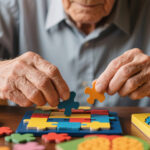Caring for a loved one with dementia presents a unique set of challenges, and among the most critical yet often overlooked aspects is ensuring proper nutrition and meal planning. As dementia progresses, individuals may experience changes in appetite, taste, memory, and physical abilities, all of which can impact their ability to eat well. This can lead to weight loss, malnutrition, dehydration, and a decline in overall health and well-being. For families and caregivers, navigating these changes can be overwhelming, often adding to the emotional and physical demands of daily care.
This comprehensive guide aims to provide families with practical, empathetic, and actionable advice on nutrition and meal planning for people living with dementia. We understand that every individual’s journey with dementia is unique, and what works for one may not work for another. Our goal is to offer a range of strategies, insights, and resources to help you create a supportive and nourishing environment, ensuring your loved one receives the vital nutrients they need while maintaining dignity and enjoyment during meal times. We will explore common eating challenges, dietary considerations, mealtime strategies, and how to adapt as the disease progresses, all while emphasizing a compassionate and patient-centered approach. By understanding the complexities of dementia’s impact on eating, families can empower themselves to provide the best possible care, fostering comfort and health for their loved ones.
Understanding Common Eating Challenges in Dementia
Dementia can manifest in various ways, and its impact on eating habits is multifaceted. Recognizing these challenges is the first step toward developing effective strategies. Here are some common issues families and caregivers might encounter:
Memory Loss and Forgetfulness
One of the most prominent symptoms of dementia is memory loss, which directly affects meal planning and consumption. Individuals may forget when they last ate, if they have eaten at all, or even how to use utensils. They might also forget the names of foods they once enjoyed or the steps involved in preparing a meal. This can lead to missed meals, repetitive eating, or an inability to initiate eating.
Changes in Appetite and Taste
Dementia can alter an individual’s sensory perceptions, including taste and smell. Foods that were once favorites might become unappealing, or new preferences may emerge. A diminished sense of smell can reduce the enjoyment of food, leading to a lack of appetite. Conversely, some individuals might develop an insatiable appetite for certain foods, particularly sweets, due to changes in brain function.
Difficulty with Chewing and Swallowing (Dysphagia)
As dementia progresses, motor skills can decline, making chewing and swallowing more difficult. This condition, known as dysphagia, can lead to choking, coughing during meals, or a fear of eating. It’s a serious concern that can result in aspiration pneumonia and significant weight loss. Recognizing the signs of dysphagia early is crucial for implementing appropriate dietary modifications.
Agitation, Restlessness, and Distraction
Meal times can be a source of agitation or restlessness for people with dementia. They might find it difficult to sit still, become easily distracted by their surroundings, or wander away from the table. This can make it challenging to complete a meal, leading to inadequate nutritional intake. A calm and consistent environment is essential to minimize these distractions.
Inability to Recognize Food or Utensils
In later stages of dementia, individuals may lose the ability to recognize food items or understand the purpose of utensils. They might try to eat non-food items or refuse to use a fork or spoon, preferring to eat with their hands. This requires caregivers to adapt their approach, offering finger foods or providing gentle assistance.
Behavioral Changes and Refusal to Eat
Behavioral changes, such as paranoia, suspicion, or stubbornness, can also impact eating. A person with dementia might refuse to eat because they believe the food is poisoned, or they might simply not want to comply with requests. These situations require immense patience and creative problem-solving from caregivers.
Dehydration
Forgetfulness can also extend to drinking, leading to dehydration. People with dementia may not recognize thirst cues or forget to drink fluids throughout the day. Dehydration can exacerbate confusion and lead to other health complications, making consistent fluid intake a critical aspect of care.
Dietary Considerations and Nutritional Needs
While addressing eating challenges, it’s equally important to focus on the nutritional quality of the food offered. A balanced diet can help maintain physical health, cognitive function, and overall well-being for as long as possible. Here are key dietary considerations:
The Importance of a Balanced Diet
Just like anyone else, people with dementia benefit from a diet rich in fruits, vegetables, whole grains, lean proteins, and healthy fats. These food groups provide essential vitamins, minerals, and antioxidants that support brain health and bodily functions. Aim for a variety of colors on the plate to ensure a broad spectrum of nutrients.
Brain-Boosting Nutrients
Certain nutrients are particularly beneficial for brain health. Omega-3 fatty acids, found in fatty fish like salmon, walnuts, and flaxseeds, are known for their anti-inflammatory properties and role in cognitive function. Antioxidants, abundant in berries, leafy greens, and dark chocolate, help protect brain cells from damage. B vitamins, found in whole grains, eggs, and legumes, are crucial for nerve function and energy production.
Hydration is Key
Dehydration can significantly worsen confusion and other dementia symptoms. It’s vital to encourage fluid intake throughout the day, even if the person doesn’t express thirst. Offer water, diluted juices, herbal teas, and broths. Foods with high water content, such as fruits and vegetables, can also contribute to hydration. Keep drinks accessible and offer them frequently.
Managing Weight Loss and Malnutrition
Weight loss is a common and serious issue in dementia. If your loved one is losing weight, consult with a doctor or a registered dietitian. They might recommend nutrient-dense foods, fortified meals, or oral nutritional supplements. Small, frequent meals and snacks can be more manageable than large meals. Sometimes, specialized care is needed to ensure adequate nutrition. For instance, in-home dementia care providers often have experience with these challenges and can implement strategies to encourage eating and monitor nutritional intake. Organizations like sharphomecare.com specialize in providing dedicated caregivers who can assist with meal preparation, feeding, and ensuring proper nutrition in a familiar home environment.
Addressing Specific Dietary Restrictions or Health Conditions
Many people with dementia also have other health conditions, such as diabetes, heart disease, or allergies, which require specific dietary modifications. It’s crucial to balance these needs with the challenges of dementia. Always consult with healthcare professionals to create a diet plan that addresses all health concerns. If a medical emergency arises or a hospital stay is necessary, ensuring continuity of care, including dietary needs, becomes paramount. In such situations, specialized hospital sitting services, like those offered by thehospitalsitters.com, can provide invaluable support by advocating for the patient’s needs, including their nutritional requirements, and ensuring they receive appropriate care during their hospital stay.
Practical Mealtime Strategies for Caregivers
Creating a positive and supportive mealtime environment can significantly improve a person with dementia’s nutritional intake and overall well-being. Here are some practical strategies caregivers can implement:
Establish a Routine
Consistency is comforting for individuals with dementia. Establishing a regular meal and snack schedule can help reduce confusion and encourage eating. Serve meals at the same time each day in a familiar setting. This routine can also help regulate appetite and digestion.
Create a Calm and Distraction-Free Environment
Minimize distractions during meal times. Turn off the television, radio, and other noise sources. Keep the dining area quiet, well-lit, and free from clutter. A calm atmosphere can help the person focus on eating and reduce agitation.
Offer Smaller, More Frequent Meals
Large meals can be overwhelming. Instead, offer smaller portions more frequently throughout the day. This approach can be less intimidating and ensure a steady intake of nutrients. Nutrient-dense snacks, such as yogurt, cheese, fruit, or nuts, can supplement main meals.
Make Food Appealing and Easy to Eat
Food presentation matters. Make meals visually appealing with a variety of colors and textures. For individuals with chewing or swallowing difficulties, modify food consistency. Pureed, mashed, or soft foods are often easier to manage. Cut food into small, bite-sized pieces. Finger foods, such as small sandwiches, fruit slices, or cheese cubes, can be excellent options for those who struggle with utensils or prefer to eat independently.
Encourage Independence and Participation
Allow the person with dementia to participate in meal preparation or setting the table if they are able. This can foster a sense of purpose and dignity. During meals, offer choices when appropriate (e.g., “Would you like chicken or fish?”) but limit options to avoid overwhelming them. Provide adaptive utensils, such as weighted cutlery or plates with high rims, to make eating easier.
Be Patient and Flexible
Meal times can take longer, and there will be good days and bad days. Be patient and avoid rushing. If a meal is refused, try again later with a different food or approach. Flexibility is key; adapt to your loved one’s changing needs and preferences. Remember that the goal is to ensure adequate nutrition, not to enforce strict mealtime rules.
Monitor Weight and Hydration
Regularly monitor your loved one’s weight and fluid intake. Keep a log if necessary. Any significant changes should be reported to their doctor. Signs of dehydration include dry mouth, reduced urination, confusion, and dizziness. Ensure fluids are always within reach and offer them frequently throughout the day.
Address Refusal to Eat with Empathy
If your loved one refuses to eat, try to understand the underlying reason. Are they in pain? Are they confused or agitated? Is the food unappealing? Avoid confrontation and try to redirect or distract them. Sometimes, a change of scenery or a different caregiver can help. If refusal persists, seek professional advice. In situations where refusal to eat leads to severe malnutrition or dehydration, professional in-home dementia care can provide structured support and specialized feeding techniques. Services from providers like sharphomecare.com can offer trained caregivers who understand the complexities of feeding challenges in dementia and can implement strategies to ensure nutritional needs are met, often preventing the need for more intensive medical interventions. If the situation escalates to a medical emergency requiring a hospital stay, the expertise of hospital sitters from thehospitalsitters.com can be invaluable. They can ensure that during critical hospital visits, your loved one’s specific dietary needs are communicated and met, and that they receive compassionate assistance with eating and drinking, especially if they are disoriented or resistant to care in an unfamiliar environment.
Adapting Meal Planning as Dementia Progresses
Dementia is a progressive condition, and nutritional needs and eating challenges will evolve over time. Adapting your approach is crucial to providing continuous, effective care.
Early Stages: Maintaining Independence and Healthy Habits
In the early stages, individuals may still be able to participate significantly in meal planning and preparation. Encourage them to continue with familiar routines and healthy eating habits. This is an excellent time to introduce brain-healthy foods and establish consistent meal schedules. Focus on maintaining independence for as long as possible, allowing them to choose foods and assist with simple tasks. This can also be a good time to discuss future care preferences, including nutritional support, with your loved one and family members. Planning for in-home dementia care, for example, can ensure that as needs change, a familiar and supportive environment is maintained. Services from sharphomecare.com can help families develop long-term care plans that include nutritional support and assistance with daily living activities, ensuring a smooth transition as the disease progresses.
Middle Stages: Increased Assistance and Structured Support
As dementia progresses to the middle stages, more assistance will likely be needed. Memory loss becomes more pronounced, and individuals may struggle with complex tasks like cooking. Focus on providing structured meal times, preparing appealing and easy-to-eat foods, and minimizing distractions. This is when finger foods and modified food textures become particularly important. Caregivers may need to offer gentle reminders to eat and drink, and sometimes, hand-over-hand assistance. Monitoring weight and hydration becomes even more critical during this phase.
Late Stages: Prioritizing Comfort and Dignity
In the late stages of dementia, eating and swallowing difficulties can become severe. The primary goal shifts to ensuring comfort, dignity, and adequate hydration and nutrition to prevent discomfort. This may involve pureed diets, thickened liquids, or even discussions about alternative feeding methods with medical professionals. It’s essential to consult with doctors and speech therapists to manage dysphagia safely. At this stage, patience and empathy are paramount. Even if food intake is minimal, the act of offering food and drink, maintaining a calm presence, and ensuring oral hygiene are vital aspects of care. During critical health events or hospitalizations that may occur in these advanced stages, the specialized support of hospital sitters can be invaluable. Thehospitalsitters.com provides professionals who can offer continuous supervision and support, ensuring that even in an unfamiliar hospital setting, your loved one receives personalized attention, including assistance with feeding and hydration, and that their comfort and dignity are prioritized.
The Role of Professional Support
Navigating the complexities of nutrition and meal planning for a loved one with dementia can be emotionally and physically draining. It’s important to remember that you don’t have to do it alone. Professional support can make a significant difference.
In-Home Dementia Care
For many families, maintaining a loved one at home for as long as possible is a priority. In-home dementia care services provide trained caregivers who can assist with meal preparation, feeding, and ensuring proper nutritional intake. These caregivers are often skilled in managing challenging behaviors around meal times, adapting to changing needs, and creating a supportive environment. Companies like sharphomecare.com offer specialized in-home care that can include meal planning, grocery shopping, cooking, and feeding assistance, allowing families to focus on quality time rather than the constant stress of caregiving. They can also provide 24-hour care or transitional care services, ensuring seamless support during various stages of the disease.
Hospital Sitters and Medical Support
There may be times when a person with dementia requires a hospital stay due to a medical emergency or other health issues. Hospital environments can be disorienting and frightening for individuals with dementia, often leading to increased confusion, agitation, and refusal to eat. In these critical situations, specialized hospital sitting services can provide continuous one-on-one support. Professionals from thehospitalsitters.com are trained to provide companionship, reorientation, and assistance with daily needs, including eating and drinking, during hospital stays. They act as an advocate for the patient, ensuring their comfort, safety, and nutritional needs are met in an unfamiliar setting, thereby reducing stress for both the patient and their family. This specialized support can be crucial in preventing further decline and ensuring a smoother recovery.
Conclusion
Nutrition and meal planning for people with dementia is a journey that requires patience, understanding, and adaptability. While the challenges can be significant, armed with knowledge and practical strategies, families and caregivers can make a profound difference in the quality of life for their loved ones. By focusing on a balanced diet, creating a supportive mealtime environment, and adapting to the progressive nature of the disease, you can help ensure adequate nutrition, maintain dignity, and foster moments of connection and comfort.
Remember to seek professional guidance from doctors, dietitians, and specialized care providers when needed. The support systems available, from in-home dementia care to hospital sitting services, are designed to ease the burden on families and provide expert assistance. By embracing a compassionate and proactive approach, you can navigate the complexities of dementia care with confidence, ensuring your loved one receives the nourishment and care they deserve.















